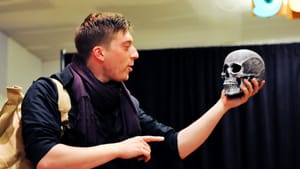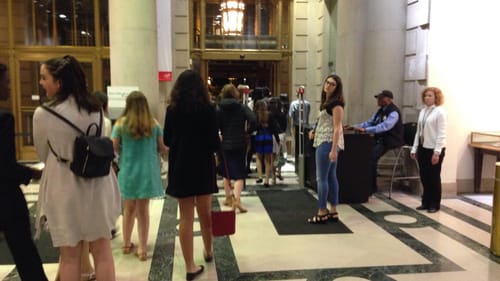Stay in the Loop
BSR publishes on a weekly schedule, with an email newsletter every Wednesday and Thursday morning. There’s no paywall, and subscribing is always free.
Turbo 'Hamlet': Holding a mirror up to kids' nature?
Philadelphia Shakespeare Theatre's 90-minute 'Hamlet'

I just received a press release about an upcoming production of A Midsummer Night’s Dream, which described that fairy-feted romp from Athens to the woods and back as “Romeo and Juliet but with a twist — everything ends happily.” It makes me wonder how much our frame of reference for Shakespeare has shrunk.
Perhaps hoping to prevent such simplification, Philadelphia Shakespeare Theatre went for the jugular in its All the World’s a Stage School Tour 90-minute production of Hamlet, which visited area high schools this spring, reaching about 4,000 students.
The essence of Hamlet
As artistic director Carmen Khan and actor Josh Kachnycz (Hamlet) explained after a special performance at the Free Library on May 10, 2017 (the auditorium was packed), they sought the lifeblood of Hamlet by whittling the action down to scenes when Hamlet tries to “uncover the truth,” or when others try to deceive him.
Yorick’s skull was still there, but the Gravedigger was out. Francisco, Bernardo, and Marcellus never existed; forget about Fortinbras. The Ghost of King Hamlet appeared around 15 seconds into the first scene, and the play’s 4,000 lines were slashed to 1,500, spoken by six actors playing just 12 characters. That led to some unique performances, such as Jenna Kuerzi playing Ophelia as well as Guildenstern, and actor Ned Pryce triple-cast as Horatio, Laertes, and Rosencrantz.
For the unwary, the playbill explained who’s who (including “The Ghost of King Hamlet: The ghost of Hamlet’s dead father”) and added a colorful “character relationship map” graphic, which I saw several teens studying avidly during the Ghost’s first speech.
Shakespeare, color-coded
With so few actors, the direction employed brightly colored scarves to help young viewers keep track of characters (and dead bodies). Several swiftly dispatched wooden cubes served as furniture and scenery. The swordplay was sharp, the actors dedicated and crisp, and the dialogue hewn from the original script was as peremptory as Claudius’s marriage.
{photo_2}
At such breakneck speed, plenty got lost: Any nuance or ambiguity regarding Hamlet’s mental state was sacrificed to a laugh-courting impersonation of a loopy crone in a purple cowl. Language lovers may have suffered, too.
For its imagery, an early speech of Horatio’s is one of my favorites, when he describes the night in “the most high and palmy state of Rome” that presaged the demise of Julius Caesar: “The graves stood tenantless, and the sheeted dead / Did squeak and gibber in the Roman streets.” This was missing from Philly Shakespeare’s show, and watching it sent me back to my own high-school copy of the play. Fifteen years ago, with a blue pen, I marked those lines.
My high-school English teacher’s Hamlet syllabus was something of a legend, passed down each year from upperclassmen who felt they had barely escaped with their sanity intact. For five consecutive homework assignments, we read an entire act of Hamlet and kept a journal tracking the action in our own words.
It’s a marvel we survived.
Today my yellowing copy is shot through with blue ink marking my favorite lines, which are part of the reason I still enjoy watching Hamlet.
Fantastic — for minimalism
“For a minimalist performance, it was fantastic,” commented one English teacher at the post-show talkback with Khan and the cast.
The cast elaborated on many of the choices shaping the truncated show, such as wringing laughs from the method of Hamlet’s madness to retain the balance of levity lost when you cut scenes like the Gravedigger’s.

With teenagers, that laughter takes only two forms, actor Aaron Kirkpatrick (Polonius) pointed out: It’s either something truly funny or the mirth of derision. Youngsters don’t have any “polite laughter” if you go for the joke and fail. Perhaps at the cost of some of the play’s beauties, Philly Shakes’s show did bring out the teens’ true laughs, sometimes in unexpected places, as during the culminating cascade of deaths.
But, as Kuerzi said, that really is kind of funny.
For the children?
An English teacher from Haverford Middle School brought his class. “I’m often told I’m crazy for doing this,” he said of being the only teacher at his school who insists on keeping Shakespeare in the curriculum. To his kids’ appreciative whoops, he asked the artists onstage to defend his choice.
Khan turned the question around: Why does he teach Shakespeare? “My reason is that this teaches us about ourselves,” he answered, to loud applause.
The urge to streamline Hamlet for the sake of the children might also teach us something about ourselves.
Kirkpatrick added that appreciating Shakespeare (even if abbreviated) helps cultivate a habit of taking time to put things into proper terms, in a society where speech gets mashed into status updates and emojis.
But it’s a weird old world we’re living in: Most of us could probably kill more time in one day just gathering the tl;dr social-media version of world news than the groundlings spent at a lengthy original performance of Hamlet. The news cycle moves so quickly the events of last week might as well be last year. Adulthood comes with no rules about attention span.
There may be benefits to taking an entire week to meet Hamlet, like I did, or discovering it in one 90-minute burst (aided, as Philly Shakes notes, by other curricular materials on offer). But our decision to present it one way or the other probably has more to do with adult perceptions and projections than it does with the accuracy of any principle that shorter is better when it comes to youngsters.
Sign up for our newsletter
All of the week's new articles, all in one place. Sign up for the free weekly BSR newsletters, and don't miss a conversation.

 Alaina Johns
Alaina Johns